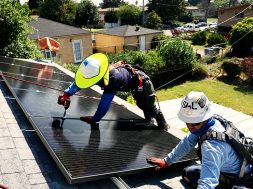
Waaree Energies turns to small-scale residential consumers to push its solar rooftop business
MUMBAI: Anticipating the growth in residential solar photovoltaic (PV) rooftop segment to pick up, Mumbai-based Waaree Energies Ltd, part of Waree Group, is launching ready-to-install solar kits for rooftops with capacity ranging from 1 to 5 kw.
The company is targeting small-scale consumers – individual households predominantly in rural and town areas – with its do-it-yourself (DIY) kits that require only two people and 30 minutes to be installed.
“The small-scale solar plant helps minimising households’ power bill. Being able to generate power at ₹3 per unit (kilowatt hours), which is just half of the purchasing power from a grid, it can become financially viable in 3-4 years time,” Sunil Rathi, Director, Waaree Energies, told BusinessLine.
“As solar is becoming financially viable for people, we believe the small-scale rooftop segment will pick up in a big way,” he said.
“The residential segment has not yet grown to the extent of the commercial and industrial segments, but with this kind of approach it will pick up.”
Apart from the solar kit, Waaree will provide the necessary approvals and micro-financing solutions, Rathi added, for which the company is currently tying up with banks and NBFIs, refusing to name any of them. Warree will be marketing its product through dealers as well as the network of solar experience centers both in India and in the international markets as the company is planning to expand operations in African countries, Nepal, Bangladesh and Sri Lanka, among other markets.
Distant potential
Major rooftop solar developers in the country have so far been focussing on commercial and industrial consumers, rather than households, even though the government provides 30 per cent capital subsidy and various other financial benefits for residential consumers using solar systems.
“The residential and MSME segments have great potential in India, but face many more obstacles relative to the commercial and industrial segment,” said Andrew Hines, co-founder, CleanMax Solar.
“Power tariffs for domestic consumers are lower than for commercial and industrial ones, and at the same time, the project cost per kW is higher for smaller systems. So the basic economics are more challenging.”
He added that a feed-in-tariff, or “rent-a-roof” policy, could solve these problems and enable this sector to take off, as has happened in other countries, but “the policy has to be very carefully drafted to ensure that it is effective”.
















